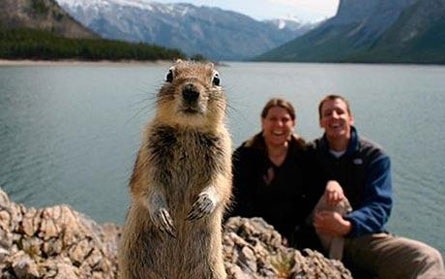This made me smile.
In the year 2000, my friend and I rented a car and drove all the way from California to Bloomington, Illinois, where David Foster Wallace was teaching at the time. I wanted to finally meet him in person, after I had been publishing his books in Italian for a few years. He had told me on the phone I could meet him at the local secondhand bookstore. The store had a big mirror on the back wall, and when he entered (I was already there) I caught him looking at himself in the mirror, with a curious expression. Unlike in any picture I had ever seen of him, his hair was surprisingly short, and he was wearing no bandanna.
He addressed me with a funny Spanish “Señor Cassini?,” probably thinking the Spanish could easily pass for Italian. I told him I expected to meet a longhaired man, and he replied, “Yeah, I just had a haircut, and I can’t get used to the way I look now. When I entered the bookstore a minute ago, I couldn’t recognize myself in the mirror.”
He was wearing shorts, a T-shirt, and I noticed how he had apparently cut the upper part of his right sock, in order to carry his wallet in it. We then went to a restaurant for lunch (cheeseburger, french fries, Coke—he taught me what a “free refill” is: we have nothing like that in Italy; if we did, everyone would drink liters and liters of free soda) and had a nice, long, complicated conversation.
At one point, he confessed with obvious embarrassment that he and his girlfriend had recently gotten cable TV, which he had for a long time resisted getting, and he told me how every time he found something good to watch, he immediately feared that there might be something better to watch on the next channel, and therefore he would never stop zapping, and never really watch anything at all, which usually resulted in an argument with his girlfriend.
He insisted on buying my friend and me lunch. When I asked him to sign copies of his books I had been carrying with me during my road trip (a copy of Infinite Jest and Italian versions of his books I had published), he wrote, “To Marco, who actually made me pay for his lunch.” (In the meantime, the waiter had prepared his doggy bag; Dave had eaten only half of his cheeseburger and was happy to take the remaining half to his Labrador back home.)
Then we moved outside the restaurant, to the parking lot, because I’d asked him to show us on a map the road to wherever my friend and I were going next. When he opened his car door to get a road atlas, I saw his red bandanna in the back, and asked him if I could have it. He told me I could, but in exchange he wanted the T-shirt I was wearing, and that I had bought two months before in Rome, at a flea market, for 3,000 lire (a couple of bucks). It was a Lucky Charms T-shirt, and he said he used to eat Lucky Charms every day when he was a kid.
Exchanging pieces of clothing in a parking lot outside a restaurant in rural Illinois must have been quite strange, and therefore my friend decided to take a few pictures of this mise en scène.
Later on, all the other times we met (not many) or corresponded, directly or through his agent, Dave made sure I was informed about the status of my T-shirt. He said it was “the gym T-shirt,” the one he used as much as he could when he went to the gym.
One day, two years ago, his one time in Italy, we were in Capri. He was there for a literary festival, and when he saw me he said: “Hey, Marco, I’m sorry—I left your Lucky Charms T-shirt back home. That’s my favorite T-shirt.”
Then he started to explain to his wife what he meant by that. I mentioned to both of them that, years before, I had lent his bandanna to Zadie Smith for an afternoon. She was impressed by the fact that I owned David Foster Wallace’s bandanna, and even mentioned it in a foreword to a book (an anthology that was, incidentally, named after one of his pitch-perfect short stories).
Those were the subjects of our talks: my T-shirt, his bandanna. Not books. Not writers. Not fiction. Just silly clothing. Lucky Charms.
—Marco Cassini














